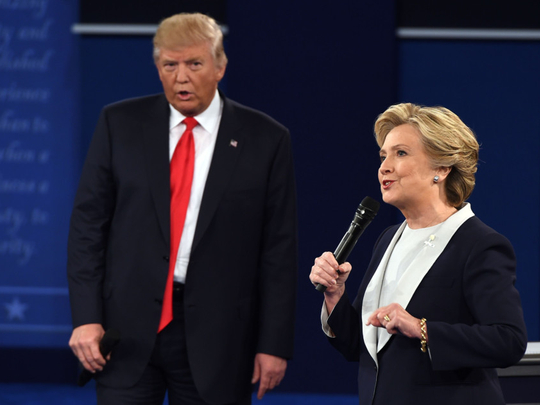
Wednesday night’s third and final presidential debate between Republican nominee Donald Trump and Democratic nominee Hillary Clinton will be eagerly watched not just in the United States, but right across the globe, not least the Middle East. Given the major differences, and the large stakes in play, international audiences are showing a very keen interest in the election outcome.
A key reason driving Middle Eastern and wider global interest is the high salience of international issues in the campaign. For instance, a Pew Research Centre Poll at the beginning of this election year found that 34 per cent of the US population believes foreign policy, especially tackling international terrorism, is the biggest challenge facing the country. By contrast, ‘only’ 23 per cent mentioned economic problems. The higher salience of foreign compared to economic issues is unusual in the past few decades. Indeed, it resembles the first 25 years of the Cold War, from 1948 to 1972, when international security issues dominated the concerns of US voters during presidential campaigns. By contrast, since the early 1970s, economic matters have tended to be the electorate’s highest priority. For instance, in December 2011, just before the last presidential election year in 2012, some 55 per cent of US citizens cited economic worries as the most important facing the country, according to Pew. By contrast, only 6 per cent mentioned foreign policy or other international issues.
The centrality of foreign and security policy issues in this year’s election largely reflects US concerns about terrorism. When the Pew poll was taken, post the Paris attacks last year, and the atrocity in San Bernardino, California, almost 18 per cent of the population believed that the terrorist danger is the biggest issue facing the country.
And an additional 7 per cent of voters asserted that Daesh (the so-called Islamic State of Iraq and the Levant) specifically (as distinct from terrorism in general), or the conflicts in Syria and Iraq, are the priority number one for the nation. These numbers will have been buoyed by further terrorist attacks, including the one last month in New York and New Jersey.
Although foreign and security policy has returned to the forefront of US electorate’s mind, at least temporarily, there are significant differences between now and during the first two decades of the Cold War. This earlier period was characterised by a relative policy consensus and widespread bipartisan cooperation on foreign and security matters.
Today, however, this policy area is significantly more divisive politically, as is underlined by the attacks by Republican candidates on US President Barack Obama, and Clinton — his former secretary of state. For instance, Trump asserts that “Obama’s foreign policy is a complete and total disaster — the worst president we have ever had”, while Obama and Clinton have described Trump as unfit to be president.
To be sure, the early Cold War consensus can be overstated. Nonetheless, a significant degree of bipartisan agreement on foreign affairs, and wider political decorum, did exist until breaking apart in the late 1960s under the strain of the Vietnam War debacle and the demise of the notion of monolithic communism in light of the Sino-Soviet split.
No clear foreign and security policy consensus has emerged in recent years. For instance, many Republicans and Democrats differ significantly on how they view the power and standing of the United States internationally; on the degree to which the country should be unilateralist; in their attitudes toward the campaign on terrorism and the methods by which they are being fought, including in the Middle East; and on what the priorities of foreign policy should be.
An example here is the campaign against Daesh where Trump have called for more much hard-line actions. This includes a fundamentally different military strategy, including potential ‘carpet-bombing’, which appears to involve intensification of US military commitments in the Middle East. Barring a significant economic development in coming weeks, it is likely that the current high salience of foreign and security issues will remain a central aspect of politics for the rest of the election year. And the partisan splits on these topics will reinforce high rates of political polarisation in the electorate in the US electorate, and also global interest in the race. Indeed, it is likely that the international focus on the race will be even higher than in 2012. Then, according to a Pew Global Attitudes Project report, more than a third of populations in countries as diverse as Britain, Germany, Jordan, Lebanon, China, India, and Japan where either “closely or somewhat closely” following the presidential campaign.
Taken overall, foreign policy and security issues are likely to maintain their high salience for the remaining weeks of the election campaign, especially should there be any further terrorist attacks on the US homeland. Partisan divisions have prevented the establishment of a foreign policy consensus in recent years, and the gaps between Trump and Clinton on these issues appear to have only widened during this crucial election year.
Andrew Hammond is an Associate at LSE IDEAS (the Centre for International Affairs, Diplomacy and Strategy) at the London School of Economics.









